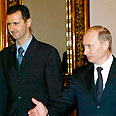
Puting and Assad. Russians have built isolating wall around Syrian president
צילום: gettyimages
Sensing West's weakness
Op-ed: Russians will be the only ones to decide when and how Assad will step down
Today it is clear more than ever: The main factor affecting President Assad's survival is Russia. Neither Iran and Hezbollah on the one hand, nor the rebels and their supporters on the other hand. Russia will decide when and how Assad will step down.
The arrogant, blatant and uncompromising Russian policy on the Syrian issue is a mirror image of the insignificance and weakness of the European and American policy on this issue. On Tuesday, the Russians broke another record. Sergei Rybakov, the Russian deputy foreign minister, did not just settle for the declaration that Russia would sell S-300 missiles to Syria despite the international pressure, but also explained that the deal was aimed at "restraining some hotheads." He isn't concealing the identity of those he is referring to either: Those countries in the European Union that are inclined to transfer weapons to the rebels, and of course the traditional rival – the Americans. He hasn't mentioned Israel, but he's referring to Israel too.
And if that were not enough, he is also threatening: If the EU countries lift the embargo on supplying arms to the rebels, they will be undermining efforts to convene an international peace conference on Syria.
It's hard to believe that up to a year ago, Russia was shocked by the hostility of the Sunni world. The Russians suddenly found themselves supporting the Shiites, being pushed away from the Arab world by an America-European axis, and failing to find their place the Arab turmoil. Since then they have picked up the pieces, set a clear strategy and they are pursuing it persistently.
The Russian policy is simple and brutal. The Russians have managed to isolate Assad from the outer world and provide him with a cover shield against Western and Israeli military and diplomatic pressures – starting with standing firmly behind Syria at the Security Council to making clear threats of a military Russian intervention if the Americans or any other element act on the threats of a direct military intervention in Syria, including an attempt to create a no-fly zone in its skies.
The American plan to deploy three Patriot missile batteries in Jordan is also seen by the Russians as a threat to the Syrian air force's freedom of the air. Their response, among other things, is executing the antiaircraft missile deal threatening the freedom of the air of Israel and any other Western aircraft at a 200-kilometer (125-mile) radius. The strikes attributed to Israel were the only cracks in the isolation wall the Russians built around Assad.
The Russians are sensing weakness. They realize that the Americans are not interested in reaching a military intervention in Syria and are enjoying the fact that Secretary of State Kerry is wooing them. Kerry is basically asking Russia to create a diplomatic solution for the Syrian issue.
The Russians, on their part, aren’t even bothering to set a date for an international conference. The moment Assad received the diplomatic and military Russian umbrella, and managed, at the same time, to keep the Syrian army by his side – he basically guaranteed the continued existence of his regime, as shaky as it may be. This will last as long as the Russians decide that the time is right for a solution that will protect their interests in Syria – without him.










